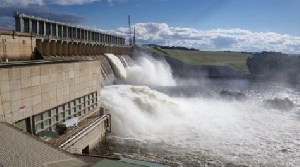If the UN Convention on the Law of the Non-Navigational Uses of International Watercourses were to be adhered to, Burkina Faso's Bagre Dam would not be starving Ghana's Akosombo Dam and causing so much flooding when its spill-gates are opened, Prof. Samuel Nii Odai, Pro Vice Chancellor of the KNUST has said.
"There are several principles, but I will give you two: one is that if you are a downstream country, the upstream country -- that is where the water is flowing from -- should not undertake any development that will negatively affect your development," Prof. Nii Odai, who is a water resources engineer, told B&FT on the sidelines of a Hydropower Conference at the University of Energy and Natural Resources, Sunyani.
"Number two: we have the responsibility for information-sharing. It is not supposed to be a warning: ‘I am going to release the water, so be ready'. That is not enough. We need to share information. What it means is that, maybe, we need to have a joint management team; then throughout the year we can know the level of the water and how to manage it."
Although Burkina Faso increased the height of the Bagre Dam by 1.5 metres to make it take more water, it has had to open the floodgates several times -- leading to flooding in Ghana.
Article 7 of the UN Convention, which deals with the matter and which is titled ‘Obligation not to cause significant harm’, requires that member-states "in utilising an international watercourse in their territories ... take all appropriate measures to prevent the causing of significant harm to other watercourse states" and compensate sharing states for any such harm.
This part of the convention has been described as the most ‘controversial’ since states are often more interested in their national interest than that of other states.
A case in point is Ethiopia's ongoing Renaissance Hydro Dam project on the Nile River, which other Nile-dependent countries, particularly Egypt, have raised concerns the project may disrupt flow of water to them.
Prof. Nii Odai indicated that a lot of collaboration needs to happen between Ghana and Burkina Faso, so that the Bagre water will be released ‘intermittently’ and not on a sudden massive scale during the rainy season.
As Chair of the three-day hydro power conference, Prof. Nii Odai charged the University of Energy and Natural Resources to undertake more research on the matter, and help policymakers devise strategies that will reduce the negative impact of the Bagre Dam on Ghana.
The conference was organised by the University of Energy and Natural Resources in collaboration with the University of Ibadan, Nigeria, on the theme ‘Sustaining. Hydropower Energy for Economic Growth and Development in West Africa’.
Business News of Wednesday, 18 November 2015
Source: B&FT













